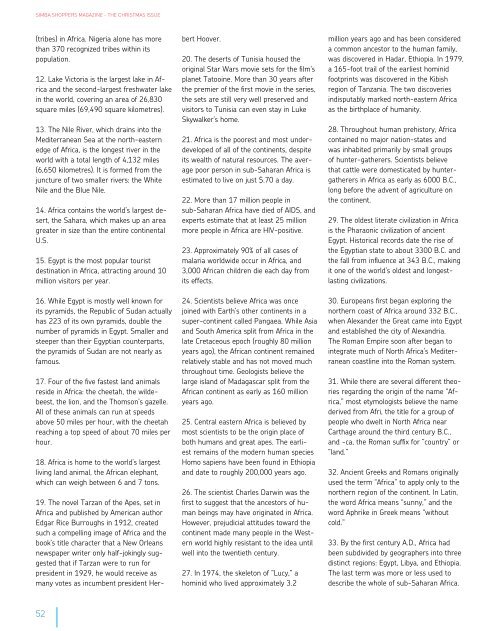Shoppers Magazine 02
19 AFTER
19 AFTER
You also want an ePaper? Increase the reach of your titles
YUMPU automatically turns print PDFs into web optimized ePapers that Google loves.
SIMBA SHOPPERS MAGAZINE - THE CHRISTMAS ISSUE<br />
(tribes) in Africa. Nigeria alone has more<br />
than 370 recognized tribes within its<br />
population.<br />
12. Lake Victoria is the largest lake in Africa<br />
and the second-largest freshwater lake<br />
in the world, covering an area of 26,830<br />
square miles (69,490 square kilometres).<br />
13. The Nile River, which drains into the<br />
Mediterranean Sea at the north-eastern<br />
edge of Africa, is the longest river in the<br />
world with a total length of 4,132 miles<br />
(6,650 kilometres). It is formed from the<br />
juncture of two smaller rivers: the White<br />
Nile and the Blue Nile.<br />
14. Africa contains the world’s largest desert,<br />
the Sahara, which makes up an area<br />
greater in size than the entire continental<br />
U.S.<br />
15. Egypt is the most popular tourist<br />
destination in Africa, attracting around 10<br />
million visitors per year.<br />
16. While Egypt is mostly well known for<br />
its pyramids, the Republic of Sudan actually<br />
has 223 of its own pyramids, double the<br />
number of pyramids in Egypt. Smaller and<br />
steeper than their Egyptian counterparts,<br />
the pyramids of Sudan are not nearly as<br />
famous.<br />
17. Four of the five fastest land animals<br />
reside in Africa: the cheetah, the wildebeest,<br />
the lion, and the Thomson’s gazelle.<br />
All of these animals can run at speeds<br />
above 50 miles per hour, with the cheetah<br />
reaching a top speed of about 70 miles per<br />
hour.<br />
18. Africa is home to the world’s largest<br />
living land animal, the African elephant,<br />
which can weigh between 6 and 7 tons.<br />
19. The novel Tarzan of the Apes, set in<br />
Africa and published by American author<br />
Edgar Rice Burroughs in 1912, created<br />
such a compelling image of Africa and the<br />
book’s title character that a New Orleans<br />
newspaper writer only half-jokingly suggested<br />
that if Tarzan were to run for<br />
president in 1929, he would receive as<br />
many votes as incumbent president Herbert<br />
Hoover.<br />
20. The deserts of Tunisia housed the<br />
original Star Wars movie sets for the film's<br />
planet Tatooine. More than 30 years after<br />
the premier of the first movie in the series,<br />
the sets are still very well preserved and<br />
visitors to Tunisia can even stay in Luke<br />
Skywalker’s home.<br />
21. Africa is the poorest and most underdeveloped<br />
of all of the continents, despite<br />
its wealth of natural resources. The average<br />
poor person in sub-Saharan Africa is<br />
estimated to live on just $.70 a day.<br />
22. More than 17 million people in<br />
sub-Saharan Africa have died of AIDS, and<br />
experts estimate that at least 25 million<br />
more people in Africa are HIV-positive.<br />
23. Approximately 90% of all cases of<br />
malaria worldwide occur in Africa, and<br />
3,000 African children die each day from<br />
its effects.<br />
24. Scientists believe Africa was once<br />
joined with Earth’s other continents in a<br />
super-continent called Pangaea. While Asia<br />
and South America split from Africa in the<br />
late Cretaceous epoch (roughly 80 million<br />
years ago), the African continent remained<br />
relatively stable and has not moved much<br />
throughout time. Geologists believe the<br />
large island of Madagascar split from the<br />
African continent as early as 160 million<br />
years ago.<br />
25. Central eastern Africa is believed by<br />
most scientists to be the origin place of<br />
both humans and great apes. The earliest<br />
remains of the modern human species<br />
Homo sapiens have been found in Ethiopia<br />
and date to roughly 200,000 years ago.<br />
26. The scientist Charles Darwin was the<br />
first to suggest that the ancestors of human<br />
beings may have originated in Africa.<br />
However, prejudicial attitudes toward the<br />
continent made many people in the Western<br />
world highly resistant to the idea until<br />
well into the twentieth century.<br />
27. In 1974, the skeleton of “Lucy,” a<br />
hominid who lived approximately 3.2<br />
million years ago and has been considered<br />
a common ancestor to the human family,<br />
was discovered in Hadar, Ethiopia. In 1979,<br />
a 165-foot trail of the earliest hominid<br />
footprints was discovered in the Kibish<br />
region of Tanzania. The two discoveries<br />
indisputably marked north-eastern Africa<br />
as the birthplace of humanity.<br />
28. Throughout human prehistory, Africa<br />
contained no major nation-states and<br />
was inhabited primarily by small groups<br />
of hunter-gatherers. Scientists believe<br />
that cattle were domesticated by huntergatherers<br />
in Africa as early as 6000 B.C.,<br />
long before the advent of agriculture on<br />
the continent.<br />
29. The oldest literate civilization in Africa<br />
is the Pharaonic civilization of ancient<br />
Egypt. Historical records date the rise of<br />
the Egyptian state to about 3300 B.C. and<br />
the fall from influence at 343 B.C., making<br />
it one of the world’s oldest and longestlasting<br />
civilizations.<br />
30. Europeans first began exploring the<br />
northern coast of Africa around 332 B.C.,<br />
when Alexander the Great came into Egypt<br />
and established the city of Alexandria.<br />
The Roman Empire soon after began to<br />
integrate much of North Africa’s Mediterranean<br />
coastline into the Roman system.<br />
31. While there are several different theories<br />
regarding the origin of the name “Africa,”<br />
most etymologists believe the name<br />
derived from Afri, the title for a group of<br />
people who dwelt in North Africa near<br />
Carthage around the third century B.C.,<br />
and -ca, the Roman suffix for “country” or<br />
“land.”<br />
32. Ancient Greeks and Romans originally<br />
used the term “Africa” to apply only to the<br />
northern region of the continent. In Latin,<br />
the word Africa means “sunny,” and the<br />
word Aphrike in Greek means “without<br />
cold.”<br />
33. By the first century A.D., Africa had<br />
been subdivided by geographers into three<br />
distinct regions: Egypt, Libya, and Ethiopia.<br />
The last term was more or less used to<br />
describe the whole of sub-Saharan Africa.<br />
34. The African region of Ethiopia is featured<br />
prominently in several ancient Greek<br />
dramas and poems. The Greek poet Homer<br />
mentions Ethiopians in both the Iliad and<br />
the Odyssey as a “blameless race” and<br />
“amongst the noblest of men.”<br />
35. Islam became a prominent influence<br />
in North Africa by the seventh century<br />
A.D. and spread into sub-Saharan Africa<br />
through trade routes and migration. The<br />
population of North Africa is still considered<br />
widely Muslim today.<br />
36. Prior to the colonization of the African<br />
continent, historians believe Africa was<br />
made up of as many as 10,000 different<br />
states and autonomous groups, ranging in<br />
size from small family groups of huntergatherers<br />
to large kingdoms.<br />
37. While slavery has been practiced in<br />
Africa all throughout recorded history,<br />
Africa is the only continent to have a large<br />
percentage of its inhabitants transported<br />
elsewhere for slave labour. Historians<br />
estimate that approximately 7–12 million<br />
slaves were transferred from Africa to the<br />
Americas between the fifteenth and nineteenth<br />
centuries.<br />
38. Only two African nations have never<br />
been under European colonial power: Liberia,<br />
an independent nation settled largely<br />
by African Americans, and Ethiopia, an<br />
Orthodox Christian nation known in Europe<br />
as Abyssinia. The rest of the continent was<br />
colonized by European imperial powers<br />
in the nineteenth century “scramble for<br />
Africa.”<br />
39. During the 1950s, colonized African<br />
states began to fight for independence<br />
from imperial rule with Libya being the first<br />
African nation to declare its independence.<br />
The independence movements brought<br />
great hope and inspired U.S. civil rights<br />
leaders like Malcolm X to fight for increased<br />
freedoms at home.<br />
40. South Africa was one of the first<br />
African nations to gain its independence<br />
from colonial rule after the imperial period.<br />
However, black residents of the state lived<br />
under a forced system of segregation<br />
called Apartheid (meaning “separateness”)<br />
until 1994 when the country held its first<br />
democratic elections with universal suffrage.<br />
The famous civil rights leader Nelson<br />
Mandela was elected as president.<br />
41. The Second Congo War, which began<br />
in 1998 and involved eight African nations,<br />
is the largest war in African history. An estimated<br />
5.4 million people died as a result<br />
of the war and its aftermath, making it the<br />
deadliest worldwide conflict since World<br />
War II. The war officially ended in 2006,<br />
but hostilities still continue today.<br />
42. Africa is currently politically organized<br />
into the African Union, a federation created<br />
in 2001 and consisting of all of Africa’s nations<br />
except Morocco.<br />
43. Islam is currently the largest religion<br />
in Africa, with Christianity following closely<br />
behind. These two religions make up 85%<br />
of the continent’s population, while just<br />
15% of the population are nonreligious or<br />
follow traditional African religions.<br />
44. While Africa is the second largest of the<br />
earth’s seven continents, it has the shortest<br />
coastline, due to very few jutting edges and<br />
bays in its landscape.<br />
45. Among the native population of Africa,<br />
there are more physical variations than on<br />
any other continent in the world.<br />
46. There are fewer people with Internet<br />
access in the entire continent of Africa than<br />
in New York City alone.<br />
47. The average life expectancy on the<br />
African continent ranges from 74 years in<br />
the island nation of Mauritius to just under<br />
32 years in sub-Saharan Swaziland.<br />
48. Two of the most popular sports in<br />
Africa are soccer (called football) and<br />
cricket. Both sports were introduced during<br />
colonial times and have flourished on the<br />
continent due to the international success<br />
of African teams.<br />
49. A popular fashion statement in eastern<br />
Africa is to wear a kanga, a large cotton<br />
cloth with a message printed on it. Kanga<br />
are worn by both men and women and<br />
they originated during the nineteenth<br />
century in Zanzibar and Mombasa.<br />
50. The “evil eye” is a term that originated<br />
in North Africa and the Mediterranean and<br />
is widely believed to cause harm, especially<br />
to the sick and vulnerable. In Morocco, it is<br />
common for men and boys to decorate the<br />
backs of their cloaks with bright red eyes<br />
to reflect back and cast off the look of the<br />
evil eye.<br />
51. In Tunisia, images of fish are often<br />
used to protect against evil. New buildings<br />
often have fish bones or tails embedded<br />
in them as they are built, and cars have<br />
brightly coloured plastic or cloth fish attached<br />
to them to provide protection to the<br />
people inside.<br />
Adapted from www.randomhistory.com<br />
Africa is the poorest<br />
and most<br />
underdeveloped of<br />
all of the continents,<br />
despite its wealth of<br />
natural resources.<br />
The average poor<br />
person in<br />
sub-Saharan Africa is<br />
estimated to live on<br />
just $70 a day.<br />
52<br />
53






